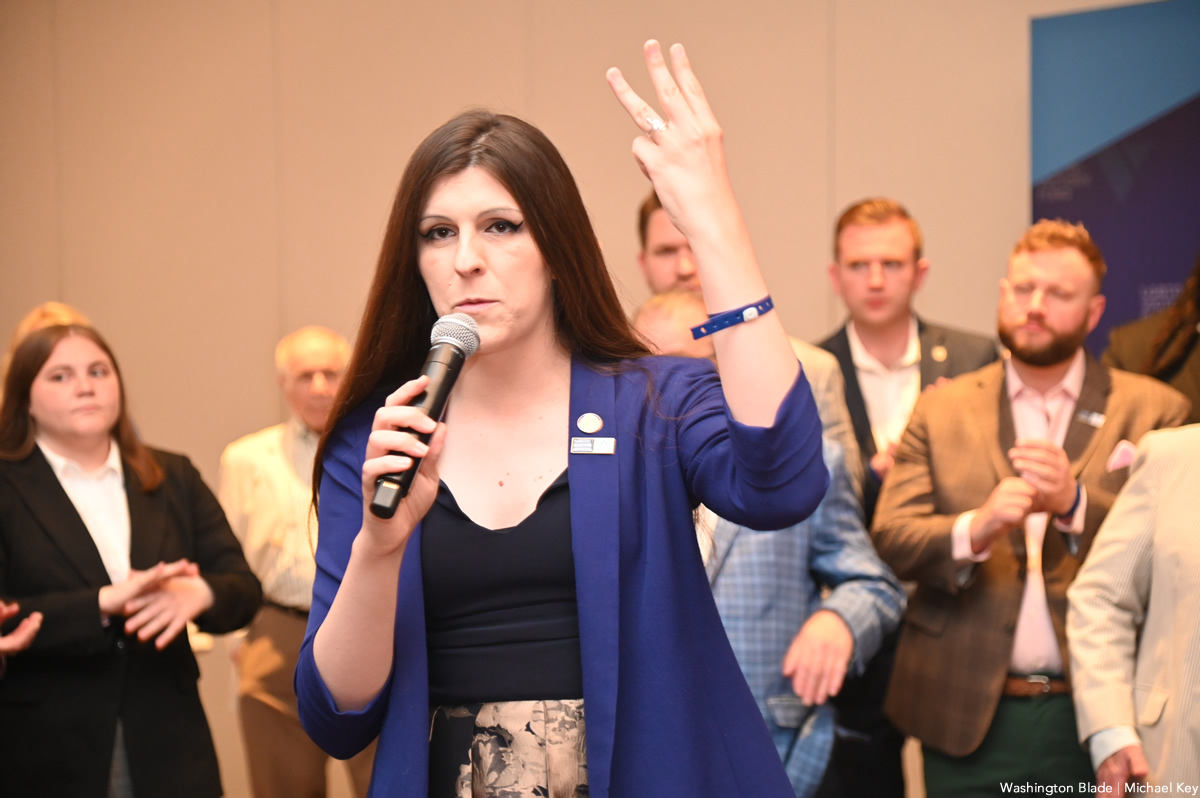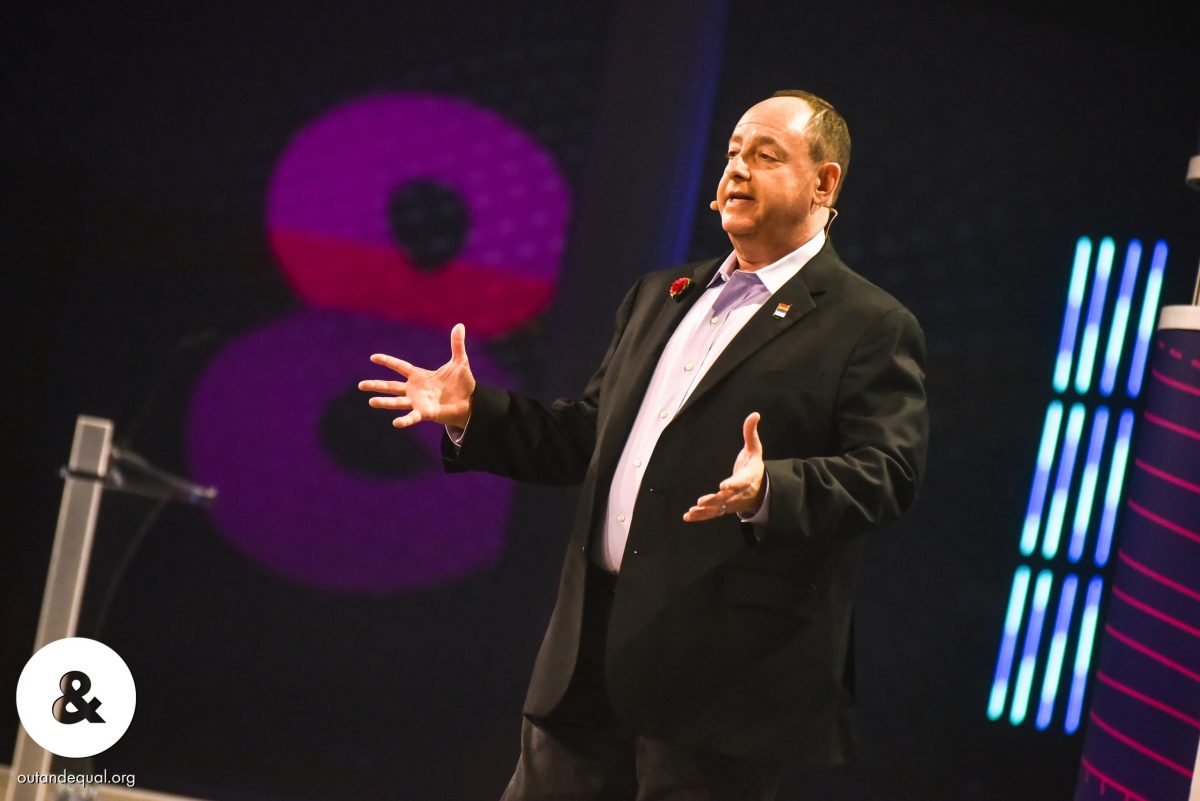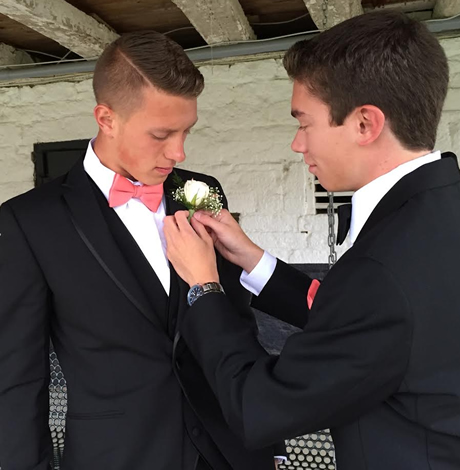Miscellaneous
A gay alumnus reflects on Penn State tragedy
When news broke this week about the heartbreaking tragedy unfolding at Penn State, a few easy predictions came to mind: iconic coach Joe Paterno wouldn’t survive; the university president would have to go too; and anti-gay hate groups would try to exploit Jerry Sandusky’s sick crimes for financial gain.
On Wednesday, my first two predictions came to pass, as the university’s board of trustees fired both Paterno and Graham Spanier. Then Thursday, Americans for Truth About Homosexuality launched its inevitable broadside against gays and the Westboro Baptist Church announced plans for one of its protests at the Penn State-Nebraska game on Saturday.
Sandusky faces 40 charges related to the alleged abuse of eight boys over 15 years, including allegations he raped at least one young boy in a shower on the Penn State campus. He used his charity, the Second Mile, which ostensibly helped at-risk children in Pennsylvania, to meet his alleged victims.
I am reluctant to address the canard that gay men are disproportionately predisposed to molesting children, as it has been debunked and disproven by dozens of studies. But in anticipation of the right-wing extremists trotting out that old lie, here goes.
AFTAH’s leader, Peter LaBarbera, is a man oddly obsessed with gay people and has devoted his life to demonizing us. You know what they say about those who doth protest too much. In his recent commentary on the Penn State scandal, LaBarbera labels Sandusky as “homosexual,” and contends, “There IS a long history connecting homosexuality to pederasty, and a disproportionate link between homosexuality and pedophilia.”
AFTAH was labeled a hate group by the Southern Poverty Law Center and has a long record of attacking gays using junk science to bolster its false claims. So consider the source.
Simply put, “homosexual men are not more likely to sexually abuse children than heterosexual men are.” That’s from the American Psychological Association.
LaBarbera cites pedophilia, but that term refers to an “adult psychological disorder characterized by a preference for prepubescent children as sexual partners,” according to medical experts. A preference for children has nothing to do with sexual orientation.
“Many child molesters don’t really have an adult sexual orientation. They have never developed the capacity for mature sexual relationships with other adults, either men or women. Instead, their sexual attractions focus on children – boys, girls, or children of both sexes,” according to experts at University of California-Davis.
And Sandusky was married with two grown children, an inconvenient fact that further undermines LaBarbera’s labels. Surveying the faces of the Penn State scandal — Sandusky, Paterno, Spanier, coach Mike McQueary, athletic director Tim Curley, vice president Gary Schultz — all are straight men. This scandal isn’t about gay men; it’s about greed and a culture that prized money over doing the right thing.
I’m a Penn State alumnus and have served on the board of the campus LGBTA Student Resource Center for several years. The Center is an important and even life-saving resource for students there. Many Penn Staters come from rural parts of the state where acceptance and understanding can be tough to find. Some are disowned by parents after coming out. The Center is there to help and support them, offering a safe space on campus to meet and socialize, educational programming and scholarships and other resources. Only about 7 percent of the nation’s colleges and universities operate such LGBT centers on campus and I’m proud that Penn State has emerged as a national leader in this area.
I’ve watched the incredible changes on campus since my graduation in 1992 with a sense of excitement, optimism and relief. There’s so much good in Happy Valley — from the pioneering work of those at the LGBTA Center, to the student athletes whose graduation rates rank No. 1 among the NCAA’s top 25 teams. Paterno wasn’t a stereotypical college football meathead. He emphasized education; the school’s library bears his name. In four years there, I met him just once. On the morning of my graduation, I stepped outside my apartment at 6 a.m. for a cup of coffee. And there, standing on the street corner alone, was JoePa. The street was deserted at that early hour and I introduced myself. He asked about my graduation, what I’d studied and my future plans. He was a grandfather figure to everyone on campus.
All of that makes what’s happening now so unimaginable to those of us who know the university. How could this happen on our campus? How could so many turn a blind eye? I fear the answers lie in details of an extensive cover-up yet to be revealed. The fact that Mike McQueary — the witness to rape who failed to intervene — remains on the coaching staff while Paterno is gone strongly suggests that we don’t have the full story yet. Did McQueary call university police only to have senior officials bury the report? Nothing would surprise me now. Regardless, Paterno, Spanier and the rest got what they deserved.
But the scandal raises deeper questions about our society. There’s been much indignation expressed about then-graduate assistant McQueary’s actions. He witnessed Sandusky raping a 10-year-old boy in the showers yet reportedly did nothing. Commentators and bloggers have insisted they would have intervened. Maybe. Or maybe not.
Last month, a two-year-old toddler was struck by two vans on a busy street in China. Eighteen pedestrians and cyclists passed by the child, who later died, before someone finally stopped to help.
That incident — and the Sandusky scandal — reminds me of a lecture I attended while at Penn State. My political science professor was talking about nationalism and the rise of the Nazi party in Germany. It was a frigid February morning and just before class started, she walked to the back of the room and opened a window. As she spoke, the classroom grew colder and colder and students began donning coats and hats. As the professor talked about the circumstances under which societies turn to nationalism and xenophobia, student after student expressed their doubt and indignation — “That could never happen in the United States.” Finally, when the cold became too much even for the professor, she said, “How can you be sure you would stand up to the government and its weapons and tanks, when none of you even had the nerve to ask me to close the window?”
It’s a lesson that rings tragically relevant today. Were senior officials afraid to call police because they wanted to protect the lucrative revenue stream provided by the football team? Were custodial staff who reportedly witnessed Sandusky’s crimes deterred from reporting him out of fear for their jobs? It’s comforting to think we’d all have helped that 10-year-old boy, but an entire network of adults failed him. And so many others.
To the students at Penn State: The eyes of the nation are upon you this weekend, so demonstrate the grace and compassion and leadership that was so lacking in your coaches and administrators. The anti-gay protesters headed your way are clowns who picket the funerals of fallen soldiers and AIDS patients. Ignore them and cheer on your team to victory.
To Penn State alumni who are disillusioned and angry: There are good people and institutions at the university and in State College who still need our support and involvement. Don’t walk away. Give your time, money and talents to those who are making a positive difference.
And to everyone else shaking your heads on the sidelines: Let this sad spectacle remind us of the need to be better people, to look out for one another and, especially, the most vulnerable among us.
Miscellaneous
Stephen Miller’s legal group sues Fairfax County schools
Lawsuit challenges policies for transgender, nonbinary students

Former Trump administration official Stephen Miller’s legal group on Tuesday filed a lawsuit against the Fairfax County School District over its policies for transgender and nonbinary students.
America First Legal in a press release notes it filed the lawsuit against the school district on behalf of a female, “practicing Roman Catholic” student “for allowing teenage boys to use the female restrooms and for forcing a radical, government-sponsored gender indoctrination and approved-speech scheme that discriminates against students on the basis of sex and religion and violates their free speech rights under the Virginia Constitution.”
The lawsuit was filed in Fairfax County Circuit Court.
The Virginia Department of Education last July announced new guidelines for trans and nonbinary students for which Republican Gov. Glenn Youngkin asked. Equality Virginia and other advocacy groups claim they, among other things, would forcibly out trans and nonbinary students.
Fairfax County schools are among the school districts that have refused to implement the guidelines.
“Fairfax County Public Schools appears to believe that its policies and regulations can override the Virginia Constitution’s protections for religious beliefs, speech and from government discrimination on the basis of sex and religious beliefs,” said America First legal Senior Advisor Ian Prior in a press release. “It is well past time for FCPS to stop sacrificing the constitutional rights of its students so that it can implement a state-sanctioned ideology that demands compliance in speech, beliefs and conduct.”
FCPS Pride, a group that represents the Fairfax County School District’s LGBTQ employees, described the lawsuit as “abhorrent.”
“We are confident that the school board and the superintendent will strongly and firmly oppose this specious suit and continue to support all students, including transgender and gender expansive students,” said the group in a press list.
Miscellaneous
More than a dozen LGBTQ candidates on the ballot in Va.
Control of the state Senate hangs in the balance

More than a dozen openly LGBTQ candidates are on the ballot in Virginia on Nov. 7.
State Del. Danica Roem (D-Manassas) is running against Republican Bill Woolf in the newly redistricted Senate District 30 that includes western Prince William County and the cities of Manassas and Manassas Park.
Roem in 2018 became the first openly transgender person seated in a state legislature in the U.S. after she defeated then-state Del. Bob Marshall, a prominent LGBTQ rights opponent who co-wrote Virginia’s constitutional amendment defining marriage as between a man and a woman. Roem would become Virginia’s first out trans state senator if she defeats Woolf.
Woolf supports a bill that would require school personnel to out trans students to their parents. The Republican Party of Virginia has highlighted this position in ads in support of Woolf.
“Thank you for reminding me why I won three elections in this district in Prince William County, which is the most diverse county in all of Virginia and the 10th most nationally where we welcome everyone because of who they are, not despite it, no matter what you look like, where you come from, how you worship, if you do, or who you love because you should be able to thrive here because of who you are, never despite it,” said Roem on Sept. 28 in response to a woman who heckled her during a debate with Woolf that took place at Metz Middle School in Manassas.
Gay state Sen. Adam Ebbin (D-Alexandria) is running for re-election in Senate District 39. State Del. Mark Sickles (D-Fairfax County), who is also gay, is running for re-election in House District 43.
Former state Del. Joshua Cole, who identifies as bisexual, is running against Republican Lee Peters in House District 65. State Del. Kelly Convirs-Fowler (D-Virginia Beach), who came out as bisexual last year at Hampton Roads Pride, will face Republican Mike Karslake and independent Nicholas Olenik.
State Del. Marcia “Cia” Price (D-Newport News), a Black woman who identifies as pansexual, is running for re-election in House District 85.
Adele McClure, a queer Democrat, is running to represent House District 2 that includes portions of Arlington County. Laura Jane Cohen, a bisexual woman who is a member of the Fairfax County School Board, is a House of Delegates candidate in House District 15.
Rozia Henson, a gay federal contractor who works for the Department of Homeland Security, is running in House District 19. Zach Coltrain, a gay Gen Zer, is running against state Del. Barry Knight (R-Virginia Beach) in House District 98.
LPAC has endorsed Jade Harris, a Rockbridge County Democrat who is running to represent Senate District 3. Harris’ website notes trans rights are part of their platform.
“Protecting trans rights, repealing right to work, strengthening unions and supporting our farmers are just a few of my legislative priorities,” reads the website. “I am dedicated to addressing the revitalization of our state’s infrastructure, fostering a favorable environment for job creation, and supporting our public education system.”
Republicans currently control the House by a 51-46 margin, while Democrats have a 21-19 majority in the state Senate.
Senate Democrats have successfully blocked anti-LGBTQ bills that Republicans have introduced since Republican Gov. Glenn Youngkin took office in January 2022.
The Virginia Department of Education in July released new guidelines for trans and nonbinary students that activists and their supporters have sharply criticized. They fear that Republicans will curtail LGBTQ rights in the state if they regain control of both houses of the General Assembly on Nov. 7.
“Time and time again, anti-equality lawmakers and the Youngkin administration have made it clear that they will continue to disrespect and disregard the lives and lived experience of LGBTQ+ people within Virginia,” said Equality Virginia PAC Executive Director Narissa Rahaman in August when her organization and the Human Rights Campaign endorsed Roem, Ebbin and other “pro-equality champions.”
“We must elect pro-equality champions who will secure and strengthen our freedoms,” added Rahaman. “We have that chance as the eyes of the nation are on us this November.”
The LGBTQ+ Victory Fund has endorsed Fairfax County School Board Vice Chair Karl Frisch and Fairfax County School Board candidates Robyn Lady and Kyle McDaniel, who identify as lesbian and bisexual respectively.
Michael Pruitt would become the first openly bisexual man elected to the Albemarle County Board of Supervisors if he were to win on Nov. 7. Blacksburg Town Councilman Michael Sutphin and Big Stone Gay Town Councilman Tyler Hughes, who are both gay, are running for re-election.
“Tyler will be a critical voice for equality as the only out LGBTQ+ person on the Big Stone Gap Town Council,” says the Victory Fund on its website.
Cal Benn contributed to this article.
Miscellaneous
What it means to be an active ally to your LGBTQ+ co-workers TEST
Five easy tips to help you avoid common risks

Your home is more than just a place to eat and sleep; it’s your safe haven. As much as you might cherish your home, you should probably also recognize the potential hazards within its familiar walls. Accidents can happen in an instant, yet with a little foresight and some simple adjustments, you can transform your house into a safer haven.
Accidents can happen anywhere, and with a few simple tweaks, you can lower risks in your space. Below you’ll find five tips for each room in your home to help prevent injuries, falls, and other mishaps. In short, home safety.
This article was inspired by a shower in a rental we managed that began leaking through the kitchen ceiling below. If only the landlord had installed grab bars, right!? Below, we’ll guide you through the steps to fortify your bathroom, making it a place of relaxation without the fear of slips and falls. Then, we’ll venture into the room where the magic happens, where proper planning can ensure great nights and peaceful mornings. We’ll show you how to prevent accidents while you experiment becoming the next Gordon Ramsey. And we’ll include a few surprising solutions for those other rooms that hold their own unique hazards, offering solutions to safeguard against unexpected mishaps.
Bathroom Safety
Install Grab Bars: Adding grab bars near the shower and toilet can provide essential support for family members of all ages. Not only can they help with getting in and out, but they can help provide stability when washing. Make sure they are securely anchored to the wall.
Non-Slip Mats: Place non-slip mats inside the shower and bathtub to prevent slips. They’re a small investment that can save you from falls and head injuries.
Adjust Water Temperature: Ensure your hot water is set to a safe temperature to avoid scalding. The hot water heater should be set to around 120°F (49°C)l, the middle setting on many water heater settings.
Medicine Cabinet Locks: If you have young children, use childproof locks on your medicine cabinet to keep harmful substances out of reach.
Proper Lighting: Ensure there’s adequate lighting in the bathroom to avoid trips and falls during nighttime visits. Nightlights can be a simple and effective solution.
Bedroom Safety
Clear Pathways: Keep pathways in the bedroom clutter free to prevent tripping. Ensure there’s enough space to move around comfortably, particularly getting around the bed. Be aware where all furniture is when walking around to avoid stubbed toes, particularly at night.
Secure Rugs: If you have throw rugs, use rug grippers or double-sided tape to keep them from slipping. Loose rugs are a common trip hazard.
Bed Rails: For anyone at risk of falling out of bed, consider installing bed rails to provide extra support and prevent falls.
Nightstands with Drawers: Opt for nightstands with drawers to keep essential items. This reduces the need to get out of bed at night, minimizing the risk of falls, as you race to grab what you need and not lose a moment’s rest.
Fire Safety: Install battery-operated smoke detectors in the bedrooms if there are none. Make sure to install them 36 inches away from an air vent or the edge of a ceiling fan. Also six inches away from the joint between the wall and ceiling. And test smoke detectors regularly.
Kitchen Safety
Non-Slip Flooring: Choose slip-resistant rugs in the kitchen, especially in areas where spills are common. Mats near the sink and stove can also help and you can often buy them fairly cheaply at Costco.
Childproof Cabinets: If you have little ones, use childproof latches on cabinets and drawers to prevent them from accessing potentially hazardous items.
Anti-tip brackets: Install an anti-tip bracket behind the range. These are often used when children are in the home. Although they are less likely to open the oven door and use it as a step stool to get to the stove-top, adults can also benefit from installing these.
Adequate Lighting: Proper lighting is crucial in the kitchen to avoid accidents. Under-cabinet lighting can illuminate work areas effectively.
Secure Heavy Items: Ensure heavy pots and pans are stored at waist level to prevent straining or dropping them from high shelves.
Sharp Object Storage: Keep knives and other sharp objects in a secure drawer or block. And handle all sharp items with extreme care, even when washing and drying. These steps reduce the risk of accidental cuts.
Other Safety Tips
Furniture Anchors: Secure heavy furniture, like bookshelves and dressers, to the wall to prevent tip-overs, especially if you have young children.
Adequate Outlets: Check for damaged outlets and replace them promptly. Avoid overloading circuits with too many devices. Install placeholder plugs in outlets to prevent young curious fingers (or tongues?) from going inside an electrical outlet.
Stair Gates: If your home has stairs, install safety gates at the top and bottom to prevent falls, especially if you have toddlers or pets to keep them off of the stairs when you cannot monitor them.
Emergency Escape Plan: Develop and practice an emergency escape plan with your family, including a designated meeting place outside.
Carbon Monoxide Detector: If your home burns any fossil fuels for heating or appliances, install carbon monoxide detectors in common areas of your home to detect this odorless gas. The D.C. building codes require this if you use a fireplace or if you have an attached garage. In essence, if there is any potential source of carbon monoxide in the home, be sure to install these detectors.
Remember, a safer home not only prevents accidents but also provides peace of mind for you and your family. Implement these simple tips to create a secure environment in every room of your house.
With these practical tips and a few adjustments, you can significantly reduce the risk of injuries and falls in your home. Enjoy peace of mind in your now much safer haven.
Scott Bloom is owner and senior property manager of Columbia Property Management.
-

 U.S. Supreme Court2 days ago
U.S. Supreme Court2 days agoSupreme Court to consider bans on trans athletes in school sports
-

 Out & About2 days ago
Out & About2 days agoCelebrate the Fourth of July the gay way!
-

 Virginia2 days ago
Virginia2 days agoVa. court allows conversion therapy despite law banning it
-

 Maryland4 days ago
Maryland4 days agoLGBTQ suicide prevention hotline option is going away. Here’s where else to go in Md.









